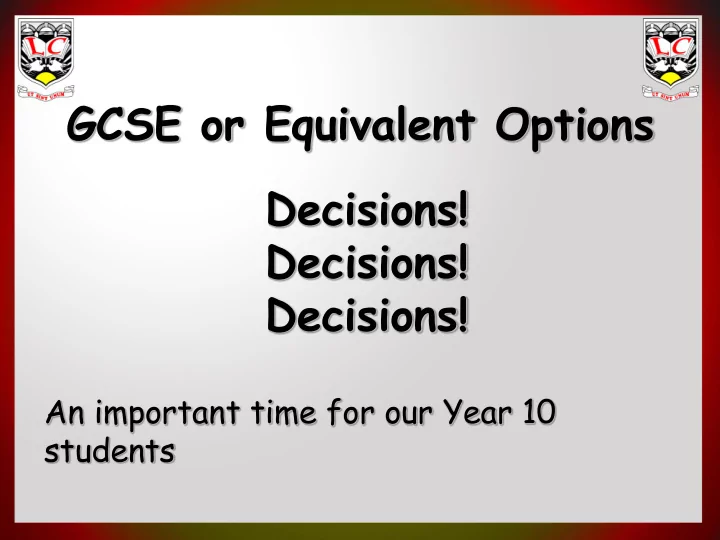

GCSE or Equivalent Options Decisions! Decisions! Decisions! An important time for our Year 10 students
The Process It is our role to help you to help your son or daughter to make the right choices for them and their future. Information is the most important factor in making choices for GCSE study. Students have seen a presentation from DEL
Options Process Introduction to options 12 th January Parent Option talk 12 th January 7pm New Subject talks 13 th January Pd 1-2 Parent Teacher meeting 29 th January 4-6pm One to one option Interviews – 12 th & 13 th February 2015 Option forms due in - Monday 23 rd February
GCSE Level Curriculum All students study: Core Subjects - not optional • GCSE English • GCSE Maths • GCSE RE • LLW – non exam • Games – non exam Optional Subjects – choice of 5 subjects
GCSE Curriculum Some students will study: Core subjects – not optional • GCSE English Language & English Literature • GCSE Maths & Further Maths • GCSE RE • LLW – non exam • Games – non exam Optional Subjects – choice of 5 subjects
How to Choose! I want to be……
Future Job Opportunities Employment sectors due to grow in the next 5- 10 years: Business & Financial Services • ICT/Computing • Agri Food Sector • Manufacturing & Engineering • Renewable Energies & Recycling • Health & Life Sciences • Creative & Digital Media •
Choosing Options • Subjects that appeal to their likes • Subjects that suit skills, abilities and talents • Subjects that keep options open at 6 th Form and beyond • Subjects with assessment that suits and gives the best opportunity for success • Seek advice
Choosing Options: • Read through the option booklet carefully • Talk to subject teachers and ask lots of questions to find out as much as possible about the subject at GCSE level • Bring your son/daughter to the Year 10 parent/teacher meeting • Attend an individual careers interview
Choosing Subjects: What we advise the students to do: • Talk to your parents and get their advice • Talk to Mrs Evans or your Careers teacher • Think about what you want to do in the future • Talk to students who currently do the subject and who want to do well
Choosing Subjects: Questions to ask teachers: • How much reading is involved? • How much writing is involved? • Will I have to complete controlled assessment? • What percentage of marks is there for • controlled assessment? • Is there an oral test? • Will I have to do independent research? • What practical skills are involved? • How much laboratory or fieldwork is involved?
What you should NOT DO when choosing your options • Choose a subject because you do or don’t like a teacher – you don’t know whose class you will be in for GCSE • Make a decision based on what your friends are choosing – you may not be in their class – there is usually more than 1 class per subject • Choose a subject because you think it is easy – no subject is easy at GCSE level
Why making the right decision is important • You will be studying the subject for 2 years • It is important that you do well in all your GCSE subjects • Once you start in Year 11 you can’t change your option choices
Options Form • On the option form, pick 5 subjects • Rank them in preference order 1 to 5 • 1 – the subject the student most wants to do • 2 – the 2 nd most preferred subject wanted and so on • Pick a reserve option (R) – this is a subject your son or daughter will do if it is not possible to get all choices ranked 1 to 5
Contacts: • Miss Atkinson – Vice Principal Teaching and Learning • Mr Montgomery – Senior Curriculum Team • Mrs Evans – Senior Curriculum Team – Head of Careers • Mrs Walters – Senior Curriculum Team – Head of Additional Educational Needs
Options Process Introduction to options 12 th January Parent Option talk 12 th January 7pm New Subject talks 13 th January Pd 1-2 Parent Teacher meeting 29 th January 4-6pm One to one option Interviews – 12 th & 13 th February 2015 Option forms due in - Monday 23 rd February
Recommend
More recommend